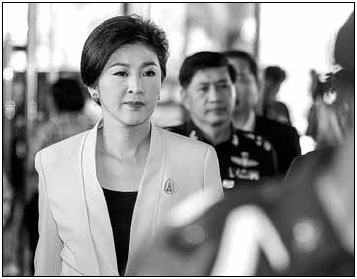Thailand to go ahead with Feb 2 election
Shots were fired at a Thai army facility where the prime minister was meeting on Tuesday, and two people were hurt, an anti-government protest leader said.
Prime Minister Yingluck Shinawatra has confirmed a general election will be held on Feb 2, a source from her party said on Tuesday after a meeting at which the election authority had proposed a delay because of unrest in the capital.
"In the meeting today, the prime minister and the Election Commission agreed to proceed with the Feb 2 election without a postponement," said a ruling party legal adviser who attended the meeting. The source declined to be named.
Yingluck had called the snap election to try to end protests in the capital aimed at overthrowing her. The protesters have rejected the election and prevented advance voting in many parts of Bangkok and the south on Sunday.
"Someone fired shots. One protester was hurt and the man who fired the shots was hurt too. They have been sent to different hospitals," said Chumpol Jumsai, a protest leader who was at the facility in north Bangkok.
The shots were fired far away from where the meeting was taking place and near where about 500 anti-government protesters had gathered.
Yingluck dissolved parliament in December and called the election to try to appease protesters trying to overthrow her. They have rejected the election, wanting political reform before any poll.
The Election Commission believes security cannot be guaranteed on Feb 2. It also says candidates have been unable to register in some constituencies, meaning there would not be a quorum to open Parliament even if voting went ahead.
The protesters had gathered at the Army Club compound in Bangkok where Yingluck held a Cabinet meeting before meeting with the Election Commission.
The protests are the latest eruption in a political conflict that has gripped Thailand for eight years and which is starting to hurt growth and investor confidence in Southeast Asia's second-largest economy.
Data on Tuesday showed manufacturing output fell in December for the ninth month running, with the political woes adding to problems caused by weak exports.
The conflict broadly pits Bangkok's middle class and royalist establishment against the mainly poor, rural backers of Yingluck and her brother, ousted former prime minister Thaksin Shinawatra.
The protesters want to suspend what they say is a fragile democracy destabilized by former telecoms tycoon Thaksin, whom they accuse of nepotism and corruption. They want to eradicate the political influence of his family by altering electoral arrangements in ways they have not spelled out.
|
Thailand's Prime Minister Yingluck Shinawatra arrives at the Army Club before a Cabinet meeting in Bangkok on Tuesday. Athit Perawongmetha / Reuters |
(China Daily 01/29/2014 page11)









